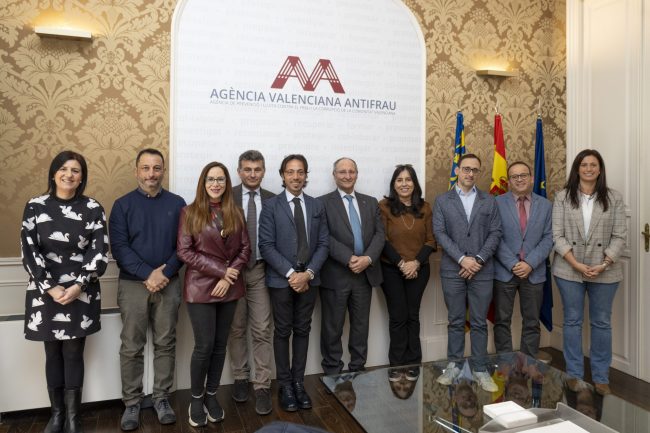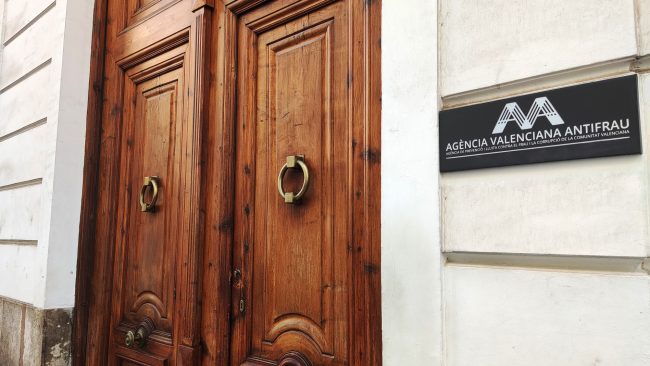106 protocols signed and 302 heads of information systems in the Valencian public administrations
- Internal information systems are key tools for the prevention of fraud and corruption in public administrations
- The Agency has signed 106 collaboration protocols with city councils, provincial councils and public companies to help them comply with Law 2/2023 on the protection of whistleblowers of corruption
- 301 public administrations have submitted to the Agency’s Register those responsible for their internal information system
València, 22 February 2024.- It is now one year since the approval by the Spanish Parliament of Law 2/2023, of 20 February, regulating the protection of people who report regulatory infractions and the fight against corruption, which includes among its obligations that administrations and public bodies have an internal information system.
The purpose of this internal system is to ensure that possible conduct or irregularities that may be followed up can be reported within the organisations themselves.
The internal information system is made up of three elements: an internal channel (mailbox) where information or complaints can be collected; a procedure that regulates how the information or complaints received will be handled, and, finally, the designation of the person who will be responsible for the management and processing of the complaints and information.
Those responsible for internal information systems can be both a natural person and a collegiate body that will be appointed by the governing body or body of the administration, which will have a period of 10 working days from the appointment to communicate it to the Valencian Anti-Fraud Agency, which is the body designated in the Valencian Community to manage the Register of Heads of Internal Information Systems.
The Law established a deadline of June 13, 2023 for public administrations and bodies to communicate to the Agency who were the persons responsible for their Internal Information Systems. In the case of municipalities with less than 10,000 inhabitants, the deadline ended on 1 December. To date, 302 bodies have complied with this procedure of notifying the Agency of those responsible for internal information systems, a procedure that can be carried out through the Agency’s electronic office.
Among the municipalities with more than 10,000 inhabitants, 48 of the 102 municipalities obliged to comply with the procedure. By provinces; in Castellón, 5 of the 12 municipalities obliged to do so have presented their leader; in Valencia 28 out of 53 and in Alicante 15 out of 37.
In the case of municipalities with less than 10,000 inhabitants, 188 of the 440 obligated to do so have communicated their head of the internal information system. By provinces, in Castellón 57 of the 123 municipalities; in Valencia 98 of the 213 municipalities and in Alicante 33 of the 104 municipalities.
Among the rest of the bodies obliged to present their internal communication managers, 8 associations have already complied with this procedure before the Agency; 14 public bodies and commercial companies in the local public sector; 13 professional associations; 10 foundations, consortia, public bodies and commercial companies of the instrumental public sector of the Generalitat Valenciana; 6 universities and university foundations and 5 consortia, among others.
In the case of the provincial councils, only the Provincial Council of Valencia has complied with the obligation to present its internal information manager.
The Valencian Anti-Fraud Agency also created its own information system and appointed the person responsible for the internal information system in June 2023.
According to the Law, failure to comply with the obligation to have an Internal Information System can constitute a very serious, serious or minor infringement depending on the circumstances and can be sanctioned with fines ranging from 1,000 euros to 1 million euros.
With the aim of helping public administrations in complying with the requirements set out in Law 2/2023, not only with regard to compliance with the implementation of internal information systems, but also with the requirement to have external complaint mailboxes or the design of anti-fraud plans, the Agency has signed 106 collaboration protocols with city councils and public companies, including the 3 provincial councils and the 6 statutory institutions.
In the event that an administration or public entity is interested in signing this type of protocol with the Agency, it can request it through the following email: jurídico@antifraucv.es




